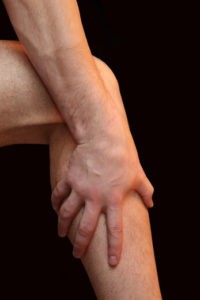Leg Cramp Relief

Leg cramps, those painful muscle contractions that occur so suddenly, usually strike during the night and shock you awake from sleep. Sometimes called “Charley horses,” they can also attack during the day while you’re driving your car, riding a bicycle, or participating in sports and other activities. Mostly they assault your calf muscles, though they may sometimes involve the muscles in your feet or thighs.
Night-time leg cramps tend to increase in frequency as we age. Pregnant women are often more at risk. Fortunately, most nocturnal leg cramps are harmless and have no known causes, except in rare instances where there is an underlying condition (see “Causes” below).
How to Stop a Leg Cramp
You can do a number of things to get fast relief when a leg cramp strikes. You may have to experiment with various techniques before discovering which ones work best for you.
For many, the quickest thing to do is what seems like the worst possible thing. Force yourself to stand up, place your foot firmly on the floor, and put all your weight on it. As unlikely as that seems, it usually works; and once you discover that it does, you’ll feel much more confident about doing it the next time.
The Website www.WebMD.com offers these suggestions for stopping a cramp:
- Walk around.
- Jiggle your leg.
- Stretch your calf muscles (see adjacent
- sidebar).
- Take a hot shower or a warm bath.
- Rub the calf with an ice pack.
Preventing Leg Cramps
When it comes to prevention, there are various things you can do to avoid leg cramps. The Mayo Clinic’s Website, www.MayoClinic.com, suggests the following:
- Drinking plenty of fluids to avoid dehydration
- Wearing shoes that have proper support
- Stretching your leg muscles, or riding a stationary bicycle, for a few minutes before you go to bed
- Untucking the bed covers at the foot of your bed
To reduce leg cramps and other discomforts of pregnancy, the Weight-control Information Network (WIN) recommends regular, moderate-intensity physical exercise. WIN is an information service established by the National Institutes of Health (NIH).
We also recommend eating plenty of potassium-rich foods, such as bananas, tomatoes, potatoes, broccoli, cantaloupe, oranges, and grapefruit.
What Causes Leg Cramps?
In most cases, nocturnal leg cramps have no identifiable cause, according to the www.MayoClinic.com Website. Rarely, however, night leg cramps may sometimes be associated with:
- Addison’s disease
- Alcoholism
- Blood pressure medications
- Cirrhosis
- Dehydration
- Type 2 diabetes
- Diarrhea
- Diuretics
- Electrolyte imbalance
- Flatfeet
- Hypothyroidism (underactive thyroid)
- Kidney failure, chronic
- Muscle fatigue
- Oral contraceptives
- Parkinson’s disease
- Second trimester pregnancy
- Peripheral artery disease (PAD)
- Gastric bypass surgery
If you think your leg cramps may be caused by any of these or other medical conditions or circumstances, please schedule an appointment with our office.
You should also contact our office if cramps keep you awake so that you can’t function the next day or if you experience muscle weakness; and if you have severe and relentless cramping, call us immediately.
How to Stretch your Calf Muscles
You can stretch your muscles either while sitting or standing.
- While sitting, straighten your leg and flex your foot up toward your knee. It may help to place a rolled towel under the ball of your foot and, while holding the towel at both ends, gently pull the towel toward you while keeping your knee straight.
- While standing about two feet from a wall, lean forward against the wall. Keep the knee of the affected leg straight and the heel on the ground. Do this while you bend the knee of the other leg.
These exercises stretch your calf muscles, and you will probably feel the leg cramp go away after a few minutes.
Source: www.WebMD.com

